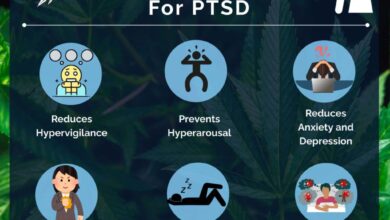
Overweight young adults likely to binge are at a heightened risk of developing unhealthy eating habits. This in-depth exploration delves into the complexities of this issue, examining the medical definitions of overweight and binge eating disorder (BED) in young adults. We’ll explore potential contributing factors, including genetics, diet, socioeconomic factors, and stress. The relationship between overweight and binge eating will be analyzed, and effective treatment strategies, potential complications, and the importance of a holistic approach will be discussed.
Understanding the unique challenges faced by this demographic is crucial for developing effective interventions. This article aims to provide a comprehensive overview of the issue, empowering young adults and their support systems with knowledge and resources.
Defining Overweight and Binge Eating in Young Adults

Navigating the complexities of body image and eating habits in young adulthood is challenging. This period often involves significant physical and emotional changes, which can significantly impact how young adults perceive and interact with their bodies. Understanding the medical definitions of overweight and binge eating disorder (BED) is crucial for early identification and intervention. It’s important to distinguish between occasional overeating and a concerning eating disorder to provide appropriate support.
Medical Definitions of Overweight and BED
Overweight is a condition characterized by an excess of body fat. In young adults, it is typically defined by a body mass index (BMI) above the 85th percentile for age and sex, although this can vary based on individual factors like bone structure. Binge eating disorder (BED) is a serious eating disorder that involves recurrent episodes of eating significantly more food than most people would eat in a similar amount of time under similar circumstances.
These episodes are accompanied by a sense of lack of control.
Common Signs and Symptoms in Young Adults
Overweight in young adults may manifest as difficulty fitting into clothes, fatigue, and discomfort during physical activities. These individuals may experience low self-esteem and negative body image, which can impact their social and emotional well-being. Symptoms of binge eating disorder in young adults often include eating large amounts of food in short periods, feeling a loss of control over eating, and experiencing guilt or shame after binging.
They might engage in compensatory behaviors like excessive exercise or purging to try and counteract the binge. Important to note is that these behaviors are frequently hidden from others, contributing to feelings of isolation and shame.
Distinguishing Occasional Overeating from BED
Occasional overeating, or eating more than usual on certain occasions, is a normal part of life. It’s different from BED, which involves a recurring pattern of binge-eating episodes accompanied by feelings of lack of control. Individuals with BED experience significant distress or impairment in their lives due to their eating habits.
Overweight young adults are often more prone to binge eating episodes, and understanding the underlying reasons is key. One contributing factor could be a hidden sugar addiction. Take this quick quiz to explore if you might be addicted to sugar, to gain insight into how your diet might be impacting your weight and overall health quiz addicted to sugar.
Ultimately, addressing these issues is crucial for young adults aiming for a healthier lifestyle and a more balanced relationship with food.
Societal Pressures and Body Image Issues
Young adults are often exposed to societal pressures regarding weight and appearance. Social media, advertising, and cultural norms can contribute to unrealistic body ideals, leading to body dissatisfaction and disordered eating behaviors. This pressure, combined with developmental challenges of self-discovery, can make young adults particularly vulnerable to weight and eating-related struggles.
Comparison of Overweight and BED
| Characteristic | Overweight | Binge Eating Disorder (BED) |
|---|---|---|
| Definition | Characterized by an excess of body fat, typically defined by a BMI above the 85th percentile for age and sex. | A serious eating disorder involving recurrent episodes of eating significantly more food than most people would eat in a similar amount of time under similar circumstances. These episodes are accompanied by a sense of lack of control. |
| Symptoms | Difficulty fitting into clothes, fatigue, discomfort during physical activities, low self-esteem, negative body image. | Eating large amounts of food in short periods, feeling a loss of control over eating, experiencing guilt or shame after binging, potentially engaging in compensatory behaviors like excessive exercise or purging. |
| Potential Causes | Genetic predisposition, lifestyle factors (diet and exercise), hormonal imbalances, stress, and emotional factors. | Genetic predisposition, emotional stress, trauma, and a history of dieting or weight-related struggles. |
| Treatment | Lifestyle changes (diet and exercise), behavioral therapy, and potentially medication in certain cases. | Behavioral therapy, particularly Cognitive Behavioral Therapy (CBT), and support groups, possibly medication in some cases. |
Factors Contributing to Overweight in Young Adults
Navigating the complex landscape of weight management in young adulthood is challenging. A confluence of genetic predispositions, lifestyle choices, and environmental factors often play a crucial role in shaping body composition. Understanding these contributing elements is vital for developing effective strategies to promote healthy weight and well-being.The journey towards a healthy weight is rarely straightforward. It’s a multifaceted process influenced by various factors that often intertwine.
This exploration delves into the key elements that contribute to overweight in young adults, highlighting the importance of a holistic approach to understanding and addressing this issue.
Genetic Predispositions to Weight Gain
Young adults may inherit genetic predispositions that influence their body’s tendency to store fat. Variations in genes related to metabolism, appetite regulation, and energy expenditure can impact how the body processes food and utilizes calories. Family history of obesity often indicates a higher risk of weight gain, showcasing the potential influence of genetic factors. Research has identified specific genes that correlate with increased body mass index (BMI) and a higher risk of obesity.
However, genetics alone do not determine an individual’s weight. Lifestyle choices and environmental factors still play a critical role.
Diet and Exercise Habits
Dietary habits and exercise routines are fundamental factors in weight management. A diet high in processed foods, sugary drinks, and unhealthy fats contributes to excess calorie intake, often leading to weight gain. Conversely, a diet rich in fruits, vegetables, whole grains, and lean proteins promotes healthy weight management. Inactivity and lack of regular physical activity also contribute significantly to weight gain.
Maintaining a consistent exercise routine, even moderate-intensity activities, burns calories and improves metabolism, supporting healthy weight maintenance.
Socioeconomic Factors and Access to Healthy Food, Overweight young adults likely to binge
Socioeconomic factors play a significant role in weight management. Access to affordable, healthy food options is often limited in low-income communities. Fresh produce and nutritious foods may be more expensive than processed alternatives, creating a challenge for individuals to maintain a healthy diet. Limited access to safe and convenient spaces for physical activity, such as parks or gyms, also impacts exercise habits.
These socioeconomic barriers contribute to disparities in weight outcomes across different demographics.
Stress and Mental Health Conditions
Stress and mental health conditions can significantly impact eating behaviors and weight. Stressful situations can trigger emotional eating, leading to overconsumption of food, particularly high-calorie comfort foods. Mental health conditions, such as depression or anxiety, can also disrupt appetite regulation and energy expenditure, contributing to weight fluctuations. Understanding the interplay between mental health and weight is crucial for developing effective interventions.
Table of Factors Influencing Weight Gain in Young Adults
| Factor | Description | Potential Impact on Weight |
|---|---|---|
| Genetic Predisposition | Inherited traits influencing metabolism, appetite, and energy expenditure. | Increased susceptibility to weight gain, potentially affecting basal metabolic rate and body fat storage. |
| Diet | Dietary choices high in processed foods, sugary drinks, and unhealthy fats. | Increased calorie intake and reduced nutrient intake, leading to weight gain. |
| Exercise | Lack of regular physical activity and insufficient calorie expenditure. | Reduced calorie burning and decreased metabolic rate, contributing to weight gain. |
| Socioeconomic Factors | Limited access to healthy food options, safe spaces for exercise, and financial resources. | Increased difficulty in maintaining a healthy diet and exercise routine, potentially contributing to disparities in weight outcomes. |
| Stress and Mental Health | Emotional eating and disrupted appetite regulation due to stress or mental health conditions. | Increased risk of overeating, altered energy expenditure, and potential weight fluctuations. |
Exploring the Link Between Overweight and Binge Eating
Young adulthood is a period of significant physical and emotional changes, often leading to fluctuating eating habits and body image concerns. Understanding the complex relationship between overweight and binge eating is crucial for developing effective interventions and support systems for this vulnerable population. This exploration delves into the prevalence, physiological, and psychological factors that connect these two issues.The connection between excess weight and the urge to binge eat is multifaceted.
While not all overweight individuals binge, there’s a clear correlation that warrants further investigation. This exploration will analyze the prevalence of binge eating disorder in this group, examine the biological and psychological drivers, and discuss potential triggers and consequences.
Prevalence of Binge Eating Disorder in Overweight Young Adults
The prevalence of binge eating disorder (BED) in overweight young adults is higher than in those of normal weight. Research consistently demonstrates a strong association between excess weight and the likelihood of developing or experiencing BED. This difference in prevalence highlights the importance of addressing the specific needs and challenges faced by overweight young adults who may be prone to binge eating.
Early intervention and support can significantly impact their well-being and long-term health outcomes.
Physiological Mechanisms Linking Overweight and Binge Eating
Several physiological mechanisms might contribute to the link between overweight and binge eating. One potential factor involves hormonal imbalances, particularly in leptin and ghrelin, which regulate appetite and energy balance. Disruptions in these hormones could lead to increased hunger and cravings, potentially triggering binge-eating episodes. Furthermore, insulin resistance, a common feature in overweight individuals, may alter the brain’s reward pathways, making certain foods more appealing and increasing the likelihood of overeating.
Additionally, changes in gut microbiota composition in overweight individuals may influence appetite regulation and contribute to increased food intake.
Young adults struggling with weight often find themselves prone to binge eating. This could potentially be linked to a variety of factors, including perhaps misleading genetic predispositions. Recent studies show that a shocking 40 percent of at-home genetic tests yield false positives, potentially leading to inaccurate self-perceptions and unhelpful dietary decisions. This highlights the importance of consulting with healthcare professionals for accurate diagnoses and tailored weight management plans, rather than relying solely on easily accessible yet potentially inaccurate tests.
Psychological Factors Contributing to Binge Eating in Overweight Young Adults
Psychological factors play a significant role in the development and perpetuation of binge eating in overweight young adults. Stress, anxiety, and low self-esteem are often intertwined with body image concerns and disordered eating patterns. Social pressures, cultural ideals, and the pervasive nature of social media often contribute to these issues. The desire for comfort or emotional regulation through food can also lead to binge eating.
Potential Triggers and Consequences of Binge Eating
Various triggers can prompt binge-eating episodes in overweight young adults. Stressful life events, social situations, or even feelings of boredom can act as triggers. Furthermore, negative self-perception and body image issues often exacerbate these episodes. The consequences of binge eating extend beyond physical health issues. Negative emotional states, social isolation, and a distorted body image can lead to further psychological distress.
Correlation Between Overweight and Binge Eating
| Correlation | Data Source | Methodology |
|---|---|---|
| Strong positive correlation between overweight and increased risk of binge eating disorder. | National Institutes of Health (NIH) studies on eating disorders. | Meta-analysis of multiple studies on eating disorders and body mass index (BMI). |
| Overweight young adults with BED tend to have lower self-esteem and higher rates of depression. | Eating Disorders Research Institute studies. | Surveys and clinical interviews with overweight young adults diagnosed with BED. |
Addressing the Issue of Binge Eating in Overweight Young Adults

Overweight and obesity, coupled with binge eating disorder (BED), present a significant challenge for young adults. Understanding effective treatment strategies is crucial for fostering healthy lifestyles and preventing long-term health complications. These strategies should address the multifaceted nature of the issue, considering both the physical and psychological aspects of the condition. Early intervention and ongoing support are key components of successful treatment.Effective treatment strategies for overweight young adults struggling with BED are multifaceted and tailored to individual needs.
They often involve a combination of therapeutic interventions, nutritional guidance, and support systems. This comprehensive approach aims to address the underlying causes of binge eating and promote healthy coping mechanisms. The goal is not just weight loss, but also the development of sustainable healthy habits and a positive body image.
Treatment Strategies for BED in Overweight Young Adults
Addressing BED in overweight young adults requires a multi-pronged approach, encompassing various therapies, nutritional counseling, and support systems. A holistic perspective, integrating physical activity, mental well-being, and social support, is crucial for long-term success.
It’s a sobering thought that overweight young adults are more prone to binge eating. This often stems from a complex interplay of emotional and psychological factors. Thankfully, there are inspiring stories like the one of a Microsoft data scientist, who, after losing a newborn son, leveraged their skills to tackle Sudden Infant Death Syndrome (SIDS) here.
While the connection might seem tenuous, both situations highlight the powerful impact of personal tragedy driving innovation and positive change, even in the face of issues like binge eating in young adults.
Role of Therapy in Managing Binge Eating
Cognitive Behavioral Therapy (CBT) plays a significant role in managing BED. CBT helps individuals identify and challenge negative thought patterns and behaviors associated with binge eating. It equips them with coping mechanisms for dealing with stress and emotional triggers that might lead to binge episodes. Other forms of therapy, such as dialectical behavior therapy (DBT), can also be helpful, especially in cases where emotional regulation and distress tolerance are significant factors.
These therapies equip individuals with the tools to understand and modify their relationship with food and emotions.
Nutritional Counseling and Weight Management
Nutritional counseling is essential for guiding individuals towards healthy eating habits. It provides personalized dietary plans, addressing specific nutritional needs and preferences. This involves education on portion control, healthy food choices, and mindful eating practices. Counselors can help identify and modify problematic eating patterns and promote a balanced approach to nutrition.
Importance of Support Groups and Community Resources
Support groups offer a safe and empathetic environment for young adults struggling with BED to connect with others facing similar challenges. These groups provide peer support, encouragement, and shared experiences, fostering a sense of community and belonging. Community resources, such as support networks and helplines, provide access to additional support and guidance. These resources can offer crucial assistance in navigating the complexities of the condition.
Holistic Approach to Treatment
A holistic approach to treatment emphasizes the interconnectedness of physical, mental, and social well-being. Regular physical activity is essential for promoting overall health and managing weight. Building coping mechanisms for stress and emotional regulation is crucial for preventing binge eating episodes. Encouraging social support and healthy relationships strengthens resilience and reduces feelings of isolation.
Treatment Approaches Table
| Approach | Description | Potential Benefits |
|---|---|---|
| Cognitive Behavioral Therapy (CBT) | Focuses on identifying and changing negative thoughts and behaviors related to binge eating. Includes techniques like cognitive restructuring and behavioral experiments. | Improved self-awareness, reduced emotional eating, enhanced coping skills, and more effective strategies for managing stress and triggers. |
| Nutritional Counseling | Provides personalized dietary plans, education on healthy eating habits, portion control, and mindful eating practices. | Improved nutritional intake, weight management, increased awareness of food choices, and promotion of sustainable healthy eating habits. |
| Support Groups | Offer a safe space for individuals to connect with others experiencing similar challenges. Provide peer support, shared experiences, and encouragement. | Reduced feelings of isolation, increased self-esteem, and development of a supportive community. |
| Holistic Approach (Physical Activity, Mental Well-being, Social Support) | Combines physical activity, mental health strategies, and social support to address the multifaceted nature of the issue. | Improved physical health, reduced stress and anxiety, enhanced emotional regulation, and strengthened social connections. |
Potential Complications of Overweight and Binge Eating: Overweight Young Adults Likely To Binge
Navigating the complexities of overweight and binge eating can be challenging, especially for young adults. These behaviors can have far-reaching consequences, impacting physical health, mental well-being, and social interactions. Understanding the potential complications is crucial for developing effective strategies for prevention and intervention.
Short-Term Health Risks
Overweight and binge eating can manifest in various immediate health issues. Stomach discomfort, bloating, and indigestion are common occurrences, often stemming from rapid consumption of large quantities of food. These immediate reactions can negatively affect daily activities and lead to feelings of shame and embarrassment. Additionally, fluctuations in blood sugar levels can trigger fatigue and difficulty concentrating, potentially hindering academic performance.
Long-Term Health Risks
The long-term effects of persistent overweight and binge eating are far more serious. These behaviors significantly increase the risk of chronic health problems, impacting overall quality of life.
Cardiovascular Issues
Obesity, a frequent consequence of overweight and binge eating, is a major risk factor for cardiovascular disease. Increased blood pressure, high cholesterol, and abnormal blood lipid levels can lead to heart disease and stroke. For example, a young adult with a history of binge eating and obesity might experience high blood pressure, increasing their risk of developing hypertension and cardiovascular complications later in life.
Type 2 Diabetes
Overweight and binge eating can significantly impair insulin function, leading to an increased risk of developing type 2 diabetes. This chronic condition requires careful management to avoid long-term complications such as kidney disease, nerve damage, and eye problems. Young adults who engage in these behaviors are at greater risk of developing type 2 diabetes compared to their peers who maintain a healthy weight and eating habits.
Sleep Apnea
The extra weight carried by individuals with overweight and binge eating tendencies can lead to sleep apnea. This sleep disorder is characterized by pauses in breathing during sleep, impacting sleep quality and increasing the risk of other health problems. The reduced oxygen intake during these episodes can lead to daytime fatigue and impaired cognitive function, making it challenging to focus on tasks and affecting overall academic performance.
Mental Health Conditions
The connection between overweight and binge eating and mental health issues is well-established.
Depression and Anxiety
Binge eating often co-occurs with depression and anxiety. The cycle of guilt, shame, and low self-esteem associated with binge eating can exacerbate existing mental health issues or contribute to the development of new ones. This negative feedback loop can be detrimental to an individual’s overall well-being and future prospects. For instance, a young adult struggling with binge eating may experience increased feelings of isolation and low self-worth, which can deepen their anxiety and depression.
Social and Emotional Well-being
Overweight and binge eating can profoundly impact social and emotional well-being. Negative self-image, feelings of isolation, and difficulty forming and maintaining healthy relationships are common consequences. Body image concerns and social exclusion can negatively affect self-esteem and confidence.
Academic Performance and Future Opportunities
The impact of overweight and binge eating extends to academic performance and future opportunities. Fatigue, difficulty concentrating, and emotional distress can hinder academic success and limit future career prospects. For example, a student struggling with binge eating might experience reduced energy levels, impacting their ability to attend classes, complete assignments, and actively participate in their studies.
Potential Complications Table
| Complication | Description | Preventative Measures |
|---|---|---|
| Stomach Discomfort | Includes indigestion, bloating, and pain due to rapid food consumption. | Eating slowly, avoiding large portions, and mindful eating practices. |
| Cardiovascular Issues | Increased risk of heart disease, stroke, and high blood pressure due to obesity. | Maintaining a healthy weight, adopting a balanced diet, and engaging in regular physical activity. |
| Type 2 Diabetes | Impaired insulin function, leading to elevated blood sugar levels. | Healthy eating habits, regular exercise, and management of underlying mental health issues. |
| Sleep Apnea | Breathing pauses during sleep, leading to daytime fatigue and impaired cognitive function. | Weight management, avoiding alcohol and sedatives before bed, and seeking professional help for sleep disorders. |
| Depression and Anxiety | Increased risk of mental health conditions due to feelings of shame and guilt associated with binge eating. | Seeking professional help for mental health concerns, engaging in therapy or counseling, and practicing stress management techniques. |
| Social and Emotional Well-being | Negative self-image, isolation, and difficulty forming healthy relationships. | Building self-esteem, seeking social support, and engaging in activities that promote positive self-image. |
| Academic Performance | Reduced energy, difficulty concentrating, and emotional distress can hinder academic success. | Prioritizing mental and physical health, developing healthy coping mechanisms, and seeking academic support when needed. |
Closure
In conclusion, overweight young adults are a vulnerable population, facing a complex interplay of physical, psychological, and social factors that can contribute to binge eating. Addressing this issue requires a multifaceted approach, encompassing medical understanding, supportive environments, and access to effective treatments. By recognizing the signs, understanding the underlying causes, and promoting a holistic approach to care, we can better support these young adults in their journey towards healthier lifestyles.





